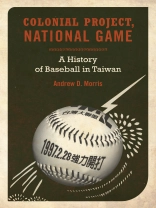In this engrossing cultural history of baseball in Taiwan, Andrew D. Morris traces the game’s social, ethnic, political, and cultural significance since its introduction on the island more than one hundred years ago. Introduced by the Japanese colonial government at the turn of the century, baseball was expected to ‘civilize’ and modernize Taiwan’s Han Chinese and Austronesian Aborigine populations. After World War II, the game was tolerated as a remnant of Japanese culture and then strategically employed by the ruling Chinese Nationalist Party (KMT) Even as it was also enthroned by Taiwanese politicians, cultural producers, and citizens as their national game. In considering baseball’s cultural and historical implications, Morris deftly addresses a number of societal themes crucial to understanding modern Taiwan, the question of Chinese ‘reunification, ‘ and East Asia as a whole.
表中的内容
Acknowledgments
Map of Taiwan
Introduction
1. Baseball in Japanese Taiwan, 1895–1920s
2. Making Racial Harmony in Taiwan Baseball, 1931–1945
3. Early Nationalist Rule, 1945–1967: ‘There’s no Mandarin in baseball’
4. Team of Taiwan, Long Live the Republic of China: Youth Baseball in Taiwan, 1968–1969
5. ‘Chinese’ Baseball and Its Discontents, 1970s–1980s
6. Homu-Ran Batta: Professional Baseball in Taiwan, 1990–Present
7. Conclusion: Baseball’s Second Century in Taiwan
Appendix: Taiwanese Professional Baseball Teams and National Origin of Foreign Players
Notes
Glossary of Chinese, Japanese, and Taiwanese Terms and Names
Selected Bibliography
Index
Photographs follow page
关于作者
Andrew D. Morris is Professor of History and Chair of the History Department at California Polytechnic State University, San Luis Obispo. He is the author of Marrow of the Nation: A History of Sport and Physical Culture in Republican China (UC Press) and coeditor of The Minor Arts of Daily Life: Popular Culture in Taiwan.












